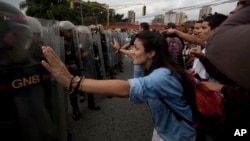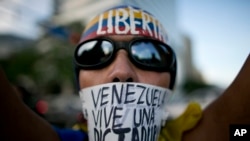Security forces violently repressed small protests that broke out in Venezuela's capital Friday after the government-stacked Supreme Court gutted congress of its last vestiges of power, drawing widespread condemnation from foreign governments.
Governments across Latin America condemned the power grab, with the head of the Organization of American States likening it to a "self-inflicted coup" by socialist President Nicolas Maduro's "regime" against the opposition-controlled congress. The United Nations' top human rights official called on the high court to reverse its decision.
In Caracas, national guardsmen in riot gear fired buckshot and swung batons at a small group of students who gathered early outside the Supreme Court. A few arrests took place and some journalists covering the demonstration had their cameras taken before the group reassembled elsewhere in the capital.
Larger demonstrations were expected later as residents of eastern Caracas, the site of weeks of anti-government unrest in 2014, awoke to an eerie calm.
In Photos:
The magistrates ruled late Wednesday that as long as lawmakers remain in contempt of past rulings, the high court, or an institution it designates, can assume the constitutionally assigned powers of the National Assembly, which has been controlled by the opposition for nearly a year and a half.
Maduro has yet to comment on the decision but there are signs that at least some top officials are in disagreement.
In a surprise pronouncement Attorney General Luisa Ortega Diaz, normally a government loyalist, said the Supreme Court's decision constituted a violation of constitutional order.
The ruling and one earlier in the week limiting lawmakers' immunity from prosecution capped a feud that began when the long-marginalized opposition won control of the legislature by a landslide in December 2015 and then mounted a campaign to force Maduro from office. The leftist leader, who has seen his approval ratings plunge amid widespread food shortages and triple-digit inflation, responded by relying on the Supreme Court to unseat several lawmakers and then routinely nullify all legislation voted there.
"This isn't any old sentence. It marks a point of no return on the road to dictatorship," said Freddy Guevara, the No. 2 leader in congress.
Peru's government immediately recalled its ambassador in protest of what it called "a flagrant break in the democratic order." Colombia called back its ambassador Friday for consultations. And Chile's left-of-center president, who has been reluctant to openly criticize Maduro, said she was deeply worried by the ruling and also ordered her ambassador to return home for consultations.
The U.S. State Department reiterated its call for Maduro to free political prisoners and hold immediate elections to resolve the crisis, saying the court decision to "usurp" the National Assembly's powers represented a "serious setback for democracy in Venezuela."
OAS Secretary General Luis Almagro called for an emergency meeting of the regional group, which held two angry sessions on Venezuela earlier this week. That meeting ended with 20 governments led by the U.S. and Mexico voicing deep concern about the Venezuelan situation but no concrete actions to hold Maduro accountable.
Luis Vicente Leon, a Caracas-based pollster, said that while the ruling completely "pulverizes the separation of powers," Venezuela long ago stopped operating like a normal democracy with a clear rule of law and independent institutions. He sees the government hardening its position in the face of mounting economic woes and international pressure, further dashing hopes for dialogue and an electoral solution.
"It's perfectly predictable that the government is going to keep radicalizing," he said.
The main opposition alliance said it was holding around-the-clock meetings to determine its next steps, but some leaders were already calling for protests as early as Saturday. Meanwhile, some hard-liners called for the military, the traditional arbiter of political disputes in Venezuela and an important crutch for Maduro, to intervene.
While the capital was generally quiet Thursday, as night fell a few people in wealthier eastern Caracas gathered on balconies and in front of homes banging pots and pans and shouting "Get out Maduro!"
"The 30 million Venezuelans need to take to the streets and confront the dictatorship," said Daniela Tani, a coordinator for one of Venezuela's opposition groups who joined about 50 people briefly blocking one of major roadways in Caracas. The protesters waved flags and stopped traffic until being surrounded by police trying to clear the street.
But it was not clear if critics of the government were in the mood for another street fight after past attempts fizzled or ended in bloodshed with little to show. Weeks of unrest in 2014 resulted in more than 40 deaths and dozens of arrests, while a mass protest last September was followed by authorities a few days later cancelling a recall petition campaign seeking to force Maduro from office before his term ends in 2019.
The Supreme Court's ruling stemmed from congress' refusal to authorize Venezuela's state-run oil company to form joint ventures with private companies, including Russia's Rosneft. State media said the ruling was not seeking to supplant congress but rather to guarantee the rule of law so long as legislators remains obstructionist by refusing to sign off on a budget and key economic decisions.
Maduro kept out of the debate, appearing twice Thursday on state TV but leaving to his aides to denounce his critics. He also received pledges from anti-American allies such as Russia, which urged external actors to refrain from interfering in Venezuela's internal affairs.
"We denounce the conspiracy by the region's right-wing to attack Venezuela's democratic system," Foreign Minister Delcy Rodriguez said on Twitter.
Associated Press writer Jorge Rueda reported this story in Caracas and AP writer Joshua Goodman reported from Bogota, Colombia. Associated Press photographer Fernando Llano in Caracas contributed to this report.





